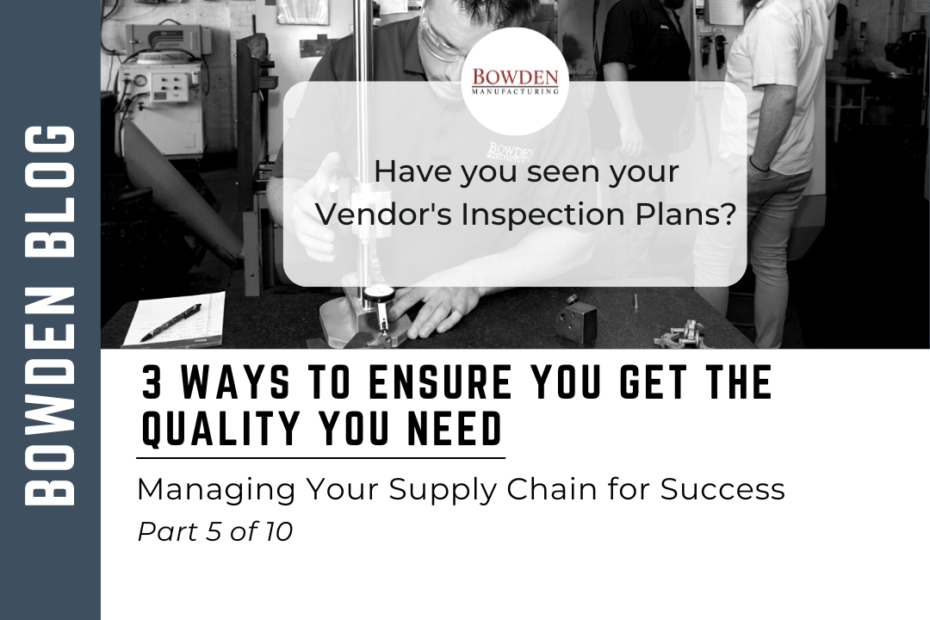Managing Your Supply Chain for Success
Part 5 of 10
We continue our Managing Your Supply Chain Series and our next topic is on Vendor Quality and how to make sure you’ve done what you can to ensure you get the Quality you need from your Vendors.
While it’s great when your Vendor can provide the pricing you need and a delivery date that allows you to meet your Customer needs, if the products show up and they aren’t correct, all the cost structures and timelines go out the window! That your Vendor provides Quality products is often assumed, but when that doesn’t happen, it can put you and your company in a world of hurt.
There are many factors outside your control that determine the Quality of parts you’ll receive from your Vendors, but that doesn’t mean you’re completely at their mercy from a Quality standpoint. You can help ensure that they will give you a Quality product along with the proper documentation you need.
Since we are both a Vendor to some companies and a Customer to others, we deal with both sides of this Quality equation.
This week, we’ll consider three questions for you to consider around Vendor Quality.
1. Does your Vendor have Quality Inspection Plans in place for your parts?
Have you seen them? Do you ask for them?!?
Seeing a Quality Inspection Plan (QIP) for your products from your Vendor provides an additional degree of confidence for you and is a positive way to ensure your Vendor is paying attention to what matters most to you. Having a conversation with your Vendor to review the QIP can heighten their awareness of key features and allow you to share details regarding mating parts that could be helpful to their process. The Quality details are an important part of establishing clear expectations with your Vendor, yet asking for a QIP ahead of time is a practice rarely done in the industry.
Additionally, your Team can provide an Incoming Inspection Plan for the products, so that your Vendor will know what features you are checking. That Plan may even show them the inspection method your Team will use, so your Vendor can consider a similar method.
None of us has time to return or repair non-conforming products and your Vendors certainly don’t want to have to repair or remake the products. Requesting the Vendor’s QIP for a product for review prior to production can help proactively eliminate potential issues.
2. Do you require a First Article Inspection report and part sample?
There’s something to be said for getting a First Article Inspection (FAI) report and even a First Article part sample. Seeing the initial parts and providing feedback to your Vendor will give both parties a more confident feeling about the remaining parts to come. Minor cosmetic issues can be adjusted, and any oversights can be caught early, rather than after a production run is completed.
Requiring a FAI report and/or a First Article sample will slow the process of transitioning to production for your Vendor, and they may have a separate charge for this service that would be an extra consideration for you. Still, when you do your part to respond in a timely fashion to both their FAI report and First Article sample, you will minimize any negative impact on both their and your operations.
The extra time for the FAI process may not seem worth it, especially since a mistake from your Vendor won’t add to your direct acquisition costs. In fact, the Vendor may repair or remake the parts, as needed, without an additional charge. However, additional energy consumed in rework, repair, and paperwork is difficult to recover and the overall time lost can be detrimental.
Even if a specific cost associated with requiring FAI reports and First Article samples must be paid, the prevention of future disruption at the front end of the process will be a minor cost compared to having the entire job delivered incorrectly.
3. Do you Need your Vendor to Have Specific Quality Certifications?
Quality certifications like NADCAP, AS9100 or ISO 9001:15 are designed to ensure your Vendors have solid systems in place to produce parts that meet your expectations. The benefit of your Vendor having solid systems is certainly a positive factor. Systematic processes that ensure they meet or exceed your technical requirements, making sure every “i” gets dotted and every “t” gets crossed, will benefit your company.
Obviously, if your Customers require specific certifications from you and your Vendor, you’ll need to make sure those certifications are in place. Unfortunately, this may both limit your options from your typical Vendor list and also increase your acquisition costs, as maintaining those certifications puts an additional burden on those Vendors.
If certifications are not required by your Customers but your experience has shown certifications would be helpful, you can adjust your Vendor list accordingly. There are definitely times when the additional horsepower of a Vendor with a particular certification will be worth paying a bit more, especially for difficult or critical components. Often the Vendors that invest in solid systems will take advantage of the opportunity for certification to validate their Quality systems and performance.
Final Thoughts
Your Vendor’s ability to provide Quality products to your company is an important part of your success. Taking proactive measures to help ensure they are set up for success is an important opportunity for you and your Team. Reviewing the Quality Inspection Plans for the products your Vendors are producing, implementing a First Article Inspection and/or sample process, and seeking Vendors with specific Quality certifications are all ways that can increase your chances of a smooth Vendor interaction.
In part 6 of our Managing your Supply Chain for Success Series, we’ll discuss Raw Material options for your parts and how they might evolve over the lifecycle of your products.
